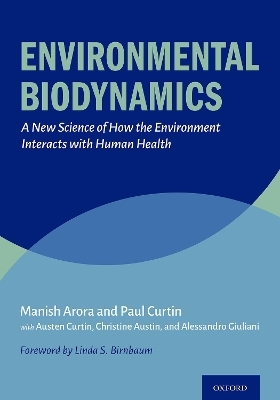
Environmental Biodynamics
Oxford University Press Inc (Verlag)
978-0-19-758294-7 (ISBN)
Is there a central scientific theory governing how human physiology interacts with the environment?
Our environment exerts a profound effect on our health and well-being. Yet, the rules guiding such interaction between individual human physiology and the environment remain elusive. While various disciplines have emerged studying components and base interactions of each system, no method has successfully predicted the dynamic behavior between these complex systems in real time.
Environmental Biodynamics offers a daring new inquiry into our environment and its impact on human health. Moving beyond a reductionist view of human physiology and the environment, this volume proposes a fundamental shift in environmental health science from quantifying structural relationships, such as static measures of environmental factors or momentary health indicators, to studying functional interdependencies in time. Across six chapters, the authors weave together the latest research from biology, environmental science, theoretical physics, mathematics, and philosophy to explore their Biodynamic Interface Theory, which states that complex systems connect primarily through a dynamic, operationally independent interface that regulates the bidirectional interactions between systems over time. Later chapters compare the proposed theory against current practice and provide suggestions for further methods of data collection and computational analysis. Supported by vivid full-color diagrams and a wealth of original data, Environmental Biodynamics is an accessible theoretical guide to this promising new field of environmental health
Manish Arora is the Edith J Baerwald Professor and Vice Chair of Environmental Medicine and Public Health at the Mount Sinai School of Medicine in New York where he directs a program at the intersection of exposure sciences, environmental epidemiology, and public health to study the environmental determinants of health and disease. Along with Drs. Alessandro Giuliani and Paul Curtin, he is credited with postulating the Biodynamic Interface Conjecture, a theoretical framework to study complex system interactions through the lens of temporal dynamics. In 2015, he was recognized with the Presidential Early Career Award for Scientists and Engineers by President Barack Obama, the highest award that the United States confers on early career scientists. Paul Curtin, is Assistant Professor of Environmental Medicine and Public Health at the Mount Sinai School of Medicine in New York. Dr. Curtin's work focuses on the interface of Systems Biology, Computational Neuroscience, and Exposure Biology. He is an author of several dozen papers in these and related fields, and leads nationally-funded projects focusing on the role of environmental factors in neurodevelopment. With co-authors and collaborators on Environmental Biodynamics, he has contributed to the development of the Biodynamic Interface Conjecture and related theoretical perspectives dealing with the interactions of complex systems. Austen Curtin is a computational biologist and data scientist in the department of Environmental Medicine and Public Health at the Mount Sinai School of Medicine in New York. Her work focuses on the integration of dynamical computational methods in contexts relating to exposure biology and neurodevelopment. She has contributed to many peer-reviewed papers in these fields and continues to work on methodological advances in these domains. Christine Austin is Assistant Professor in the Department of Environmental Medicine and Public Health at Mount Sinai School of Medicine in New York. She received her PhD from the University of Technology, Sydney, Australia in 2011, specializing in elemental bioimaging of tissues using laser ablation-inductively coupled plasma-mass spectrometry. She completed postdoctoral training at the University of Sydney, Australia and the Icahn School of Medicine at Mount Sinai, USA. Dr. Austin's research focus is developing novel analytical techniques to reconstruct histories of environmental exposures throughout life, including the prenatal and early childhood periods. Alessandro Giuliani is Senior Scientist at the Istituto Superiore di Sanità (Italian NIH). He is involved mainly in the generation and testing of soft physical and statistical models for life sciences, with a special emphasis on the elucidation of mesoscopic complex systems like network approach to protein structure/function, quantitative structure/activity relations in medicinal chemistry, analysis of physiological time series, and biophysical approaches to gene expression regulation. He is the author of many publications on a wide spectrum of research fields and has a solid teaching experience in applied statistics and research methodology. Linda S. Birnbaum is Scientist Emeritus and Former Director of the National Institute of Environmental Health Sciences and National Toxicology Program. She is also Scholar in Residence at the Nicholas School of the Environment at Duke University.
Foreword by Linda S. Birnbaum
Preface
Chapter 1: Introduction to Environmental Biodynamics
Chapter 2: The Lens of "Thingness": Structuralism, Reductionism and Simplicity
Chapter 3: The Shape of Change: Complexity, Organization, and Chaos
Chapter 4: The Process of Interdependence: Temporal Dynamics of Biodynamic Interfaces
Chapter 5: The Geometry of Health: Patterns, Structures, Forms, and Constraints
Chapter 6: The Layers of Life: Emergent Complexity and Self-Organization
Appendix: Operationalizing Environmental Biodynamics
| Erscheinungsdatum | 06.09.2021 |
|---|---|
| Co-Autor | Austen Curtin, Christine Austin, Alessandro Giuliani |
| Zusatzinfo | 32 full color illustrations |
| Verlagsort | New York |
| Sprache | englisch |
| Maße | 267 x 188 mm |
| Gewicht | 522 g |
| Themenwelt | Sachbuch/Ratgeber ► Gesundheit / Leben / Psychologie |
| Studium ► Querschnittsbereiche ► Prävention / Gesundheitsförderung | |
| Naturwissenschaften ► Biologie | |
| Technik ► Umwelttechnik / Biotechnologie | |
| ISBN-10 | 0-19-758294-X / 019758294X |
| ISBN-13 | 978-0-19-758294-7 / 9780197582947 |
| Zustand | Neuware |
| Informationen gemäß Produktsicherheitsverordnung (GPSR) | |
| Haben Sie eine Frage zum Produkt? |
aus dem Bereich


